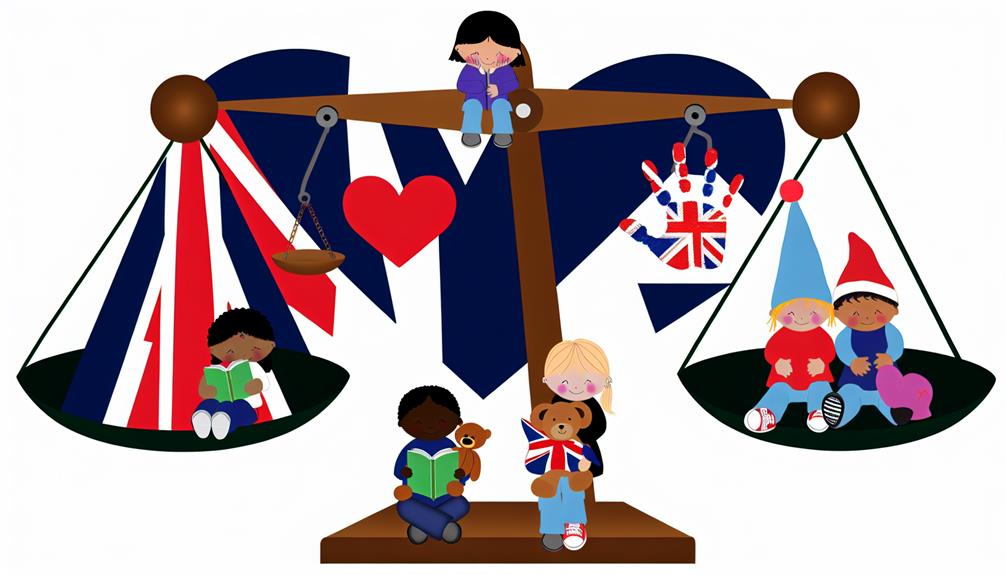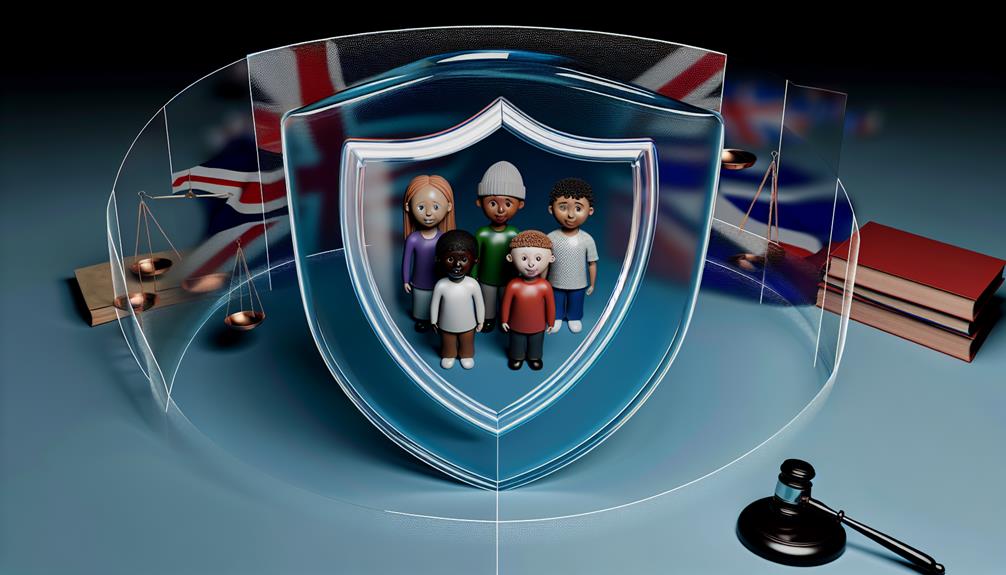Children's rights in UK foster care are essential for their well-being. They serve as a legal safeguard, ensuring kids are protected, their needs met, voices heard, and lead lives akin to their peers. They're not just rules, they're fundamental shields against potential harm. These rights set standards for living conditions, education, and healthcare, shaping children's experiences and opportunities. Without them, children may face neglect or abuse, hence the importance of strict implementation and monitoring can't be overstressed. By further exploring this subject, you'll discover more about the intricate workings of these protective mechanisms.
Key Takeaways
- Children's rights in UK foster care ensure their fundamental protections against harm and neglect.
- They set standards for living conditions, education, and healthcare in the foster system.
- Legal frameworks in children's rights outline the obligations and responsibilities of caregivers.
- Rights education empowers foster children to voice their concerns and participate in care planning.
- Implementing and monitoring children's rights can improve their everyday experiences and future opportunities.
Understanding Childrens Rights

To truly grasp the essence of children's rights in the UK foster care system, you must first understand that every single child is entitled to these fundamental protections, regardless of their circumstances. These rights aren't just vital; they're tangible and enforceable.
A significant aspect of these rights is Rights Education. As a caregiver, you're not only responsible for the child's physical well-being, but you're also tasked with ensuring they comprehend their rights. This knowledge empowers them, allowing them to recognize and voice any violation of their rights.
Legal Representation is another pivotal aspect of children's rights in foster care. Every child has the right to independent advice and representation, especially in decisions that directly affect their lives. This legal safeguard ensures that the child's voice is heard and their best interests are upheld in court proceedings.
Understanding these rights is more than just a legal obligation; it's about empathetically recognizing the inherent dignity and value of each child. By doing so, you're not only protecting them from potential harm, you're also laying a foundation for their future resilience and success. As a stakeholder in the foster system, this understanding is essential to your mastery of child care.
UK Foster Care System Overview
Having illuminated children's rights, let's now explore the UK foster care system's structure and operations to better comprehend how these rights are implemented and upheld.
The system is vast, comprising numerous caregivers, social workers, and coordinators. Caregiver profiles vary immensely, from single adults to couples, each with unique skills and experiences that shape their caregiving approach. Despite this diversity, they all share a common goal: to provide a nurturing environment for vulnerable children.
However, the system faces numerous challenges:
- Limited resources leading to overstretched services
- High turnover rates among social workers
- Inadequate support for caregivers
- Insufficient training in handling complex behaviors
- Lack of a robust mechanism for children's feedback
The system's obstacles often hinder its ability to fully uphold children's rights. But, remember, understanding these challenges is the first step towards improvement. By acknowledging these issues, you can help raise awareness and contribute to making a change.
In the end, it's about ensuring that every child feels safe, respected, and loved, regardless of their circumstances. And understanding the UK foster care system is a significant step in this direction. Let's investigate further in our next section, focusing on the role of children's rights in foster care.
Role of Childrens Rights in Foster Care

While it's evident the UK foster care system faces its share of challenges, it's equally important to understand how children's rights play a crucial role in shaping the care children receive and the policies that govern this sector. Rights Awareness isn't just about acknowledging these rights exist, but also about ensuring they're respected and defended.
Your understanding of the legal framework is essential. This framework enforces children's rights by outlining the obligations and responsibilities of those involved in foster care. It's designed to protect kids from potential harm and to ensure their well-being is prioritised. It sets the standards for their living conditions, education, and access to healthcare, among other crucial aspects of their lives.
But it's not enough to have these rights and laws on paper. They must be effectively implemented and monitored. Children in foster care need to be made aware of their rights and empowered to speak out if they're violated.
Impact of Policies on Foster Children
Every policy affecting foster children in the UK has a profound impact on their lives, shaping their everyday experiences and future opportunities. As a result, the significance of policy evaluation can't be overstated.
Consider the legislative impact of these policies:
- Policies dictating foster home circumstances can either provide a stable environment or one where children feel transient and insecure.
- Education policies can either facilitate a child's development or unwittingly hamper their academic progress.
- Policies concerning emotional and psychological support can make the difference between trauma and healing.
- Access to healthcare policies can either safeguard a child's physical health or leave them vulnerable.
- Legislation regarding family contact could either maintain crucial relationships or sever important ties.
You ought to recognize that these policies aren't just regulations or guidelines—they are the daily realities of foster children. They can significantly alter a child's life trajectory. Hence, it's crucial to critically assess each policy, understanding its implications, and make sure it truly serves the best interests of the child. The rights of foster children are too important to leave to chance or poorly considered policies. Their futures hang in the balance.
Strengthening Rights Protection in Foster Care

To strengthen the rights of children in foster care, we must develop robust policies that prioritize their needs, uphold their dignity, and safeguard their well-being. Besides statutory measures, it's crucial to enhance legal frameworks that protect these vulnerable children.
Consider the implementation of rights advocacy within these frameworks. This would guarantee children in foster care not only have their rights respected but also have avenues to voice any concerns about their treatment. By engaging directly with the children, we can better understand their unique situations, enabling us to address their individual needs more effectively.
Moreover, we should involve the children in their care planning, reinforcing their right to participate in decisions affecting their lives. By doing so, we can promote their sense of agency and self-worth.
Frequently Asked Questions
What Is the Process for Becoming a Foster Parent in the Uk?
To become a foster parent in the UK, you'll undergo a thorough process. It'll involve overcoming application challenges and completing foster parent training, ensuring you're fully equipped to provide a safe, nurturing environment.
How Are Children's Rights in Foster Care Different From Those of Biological Children?
You might think foster children's rights differ from biological kids, but they're equal. Despite adoption challenges and foster care stigma, UK law guarantees all kids, regardless of circumstance, have the same protection and rights.
What Should a Foster Child Do if They Feel Their Rights Are Being Violated?
If you're a foster child and feel your rights are violated, it's essential to raise rights awareness. Don't hesitate to report confidentially to a trusted adult or authority. Your voice matters, so make it heard.
How Does the UK Compare to Other Countries in Terms of Children's Rights in Foster Care?
You might think the UK lags behind in children's rights. Yet, in international comparisons, the UK's foster care legislation actually prioritizes child welfare robustly, often more so than other countries.
Are There Any Specific Laws or Policies in Place to Protect the Mental Health of Foster Children in the Uk?
Yes, the UK's foster care system emphasises 'Trauma Informed Care' and 'Therapeutic Interventions.' These policies prioritise a child's mental health, ensuring they're given appropriate support to overcome any psychological challenges they may face.
Conclusion
In the UK foster care system, children's rights are the cornerstone that guides every decision, shaping policies like a sculptor moulding clay. These rights guarantee kids aren't just surviving, but thriving, painting their futures with brighter colours.
Strengthening these rights is vital – like securing the foundations of a house. After all, every child deserves a safe, loving home where they can grow, learn and dream.




